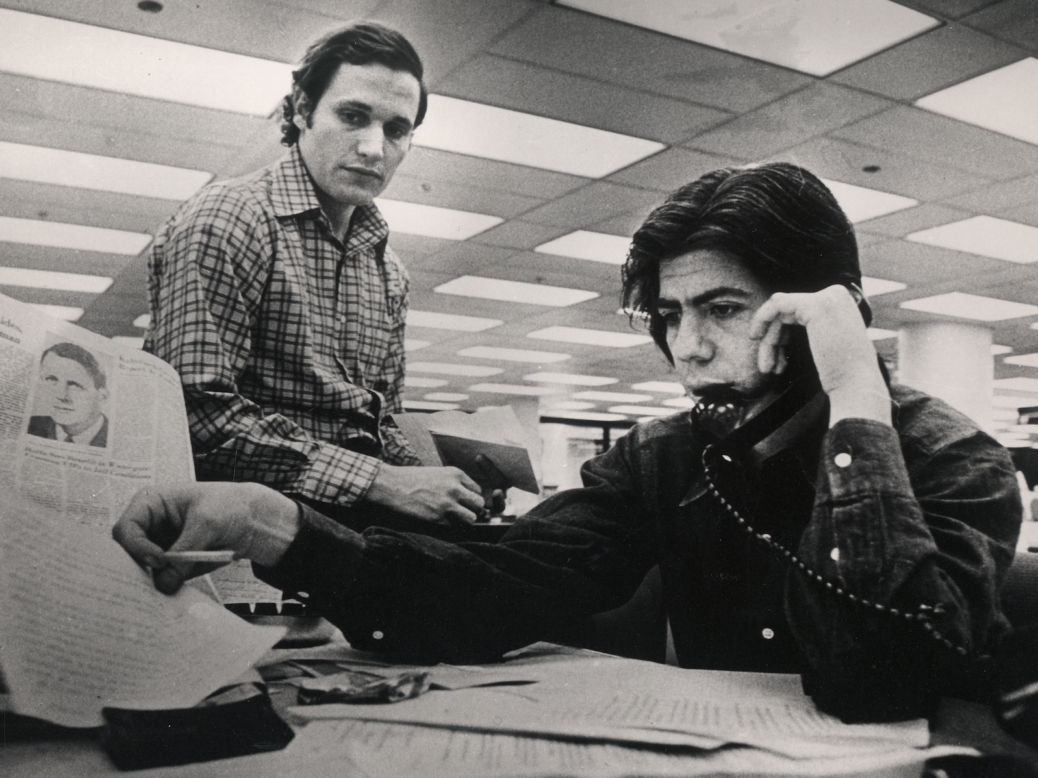
The Washington Post of 2022 is in some ways a greater force than it was in 1972 when it produced the biggest journalistic scoop in history, Watergate.
Its newsroom is bigger than ever and employs more than 1,000 journalists. The Washington Post is today an international news giant with nearly 3m online subscribers.
And yet, senior managing editor Cameron Barr concedes, it is difficult to envision the Post – or any other news outlet – producing a story today that will be the subject of a Press Gazette interview in 50 years’ time.
“It’s hard to imagine a single news organisation identified with a single run of coverage that has such a profound impact on the politics of this country,” Barr says.
“I think there are some aspects to the Post’s coverage of Watergate, and all the ensuing developments, that are a unique moment in journalistic history.”
Click here to subscribe to Press Gazette’s must-read newsletters, Future of Media and Future of Media US |
This month marks 50 years since five men were arrested after attempting to bug the offices of the Democratic National Committee at the Watergate hotel and office building in Washington, DC.
On 19 June 1972, Bob Woodward and Carl Bernstein (pictured above in 1973) reported that one of the five men arrested was James W. McCord Jr, a former CIA employee who was at the time employed as a security coordinator for President Richard Nixon’s re-election committee.
In August 1974, following a series of revelations from the Post, a House Judiciary Committee investigation into Watergate, and a failed cover-up, Nixon resigned in disgrace.
The media landscape in the US has changed dramatically since the 1970s – “there were a handful of key newspapers in this country, and basically three major television networks,” says Barr, who is second-in-command to the Post’s executive editor, Sally Buzbee.
But the Post’s mission remains the same, he says. “Day after day, week after week, certainly year after year, we see the impact of that. We see the impact of aggressive journalism, certainly not just in the United States but everywhere, and how that holds power to account…
“We’re still out there every day – we’re still publishing stories every day that hold power to account in important ways and have significant impact.”
Barr offers as an example the Post’s coverage of the 6 January insurrection of the Capitol, for which it won a Pulitzer for public service.
“That’s a way I think we continue to provide the kind of reporting and scrutiny and journalistic accountability that is necessary for this democracy to function,” he says. “That in many ways is as true today as it was in the early 70s. Even though the nature of media, and our industry, has changed dramatically in the five decades that have elapsed.”
Why Trump is still standing

Cameron Barr is senior managing editor of the Post
(photo by Marvin Joseph/The Washington Post)
The Watergate scandal brought down Richard Nixon, who did not return to politics after his 1974 resignation.
The 6 January insurrection – which is currently the subject of a select committee investigation – is the latest of several scandals relating to Donald Trump’s presidency, many of which have been exposed by the press.
But still Trump is tipped by many as a potential (winning) candidate for the 2024 presidential election. What does this tell us about modern America and the media’s role in it?
“I think that says we live in a very politically polarised country,” says Barr. “We’ve all struggled in recent years with a diminution of faith in institutions, a growing uncertainty about the nature of truth… and I think that tells us that we have work to do in providing a journalism that is credible, that appeals… to Americans across the political spectrum as much as possible.
“I’m not saying we’re entirely successful in doing that, but that must be our goal.”
He adds: “The only way to help address that polarisation is to provide factual stories that are relevant to the public debate, that provide new information, that hold power to account.
“I think there’s tremendous public service to be accomplished in delivering that sort of journalism. And that’s the only thing that can counter what seems to be the loss of faith that people experience – not just in American society, but in many developed countries – in the midst of a cacophonous media universe where anything and everything can be said and it’s hard for the truth to win out.
“But nonetheless, that has to be our mission – that has to be our day to day activity, we have to prevail on people to believe in what we report. And those are high standards – that means that we have to get it right. We can’t afford to make mistakes. When we do make mistakes, we have to own up to them and explain what we did wrong.”
Watergate: the first of many ‘gates’
One of the lasting journalistic legacies of the Watergate scandal is the use of the suffix ‘-gate’ to denote a scandal. Is it over-utilised by the media in 2022?
“I think that’s been true for decades,” says Barr. “But it’s a useful suffix that can out scandal. You just got through Partygate, right?” (The UK alone currently has Partygate, Beergate and, as of this week, Carriegate.)
“I suppose it probably is [overused],” Barr adds. “But on the other hand, it is also a reflection of how profound a contribution The Washington Post made to the politics of that time. Every time they use that suffix they evoke the importance of what we did.”
Does the overuse of ‘gate’ mean that modern journalism is too eager to declare a story a scandal?
“I don’t know that there’s one good answer to that,” says Barr. “I think journalists have a responsibility not to hype what isn’t important. That sometimes runs counter to our interests because we get caught up in the moment and everything seems like an outrage.”
Barr says that editors at the Post use “great discretion” to ensure they don’t “overhype what isn’t really a scandal”.
“We go through calculations all the time,” he adds. “The last time this came up was in considering coverage of monkeypox… We took steps here not to overplay that story. Because it was not yet clear, we didn’t want to alarm people.
“So there is a lot to be said for restraint and for the importance of restraint in the playing of news. That’s as important a value in our decision making as accuracy or fairness. Getting it right also means playing it right, and framing it correctly.”
At the time of Watergate, the Post could place a story on its front page to signify its importance. In an age when many readers come through Google or social media, how difficult is it to contextualise stories now?
“I’m not going to tell you there are no challenges associated with digital journalism – of course there are many,” says Barr. “But I would never go backward. The capacity for journalism is hugely magnified by the tools that digital publication gives us…
“I still think framing is important and that can be accomplished within the piece itself. It’s not just something that comes with being able to put something at the top of a front page versus the inside of the paper. It’s how something is written and how it’s contextualised within that piece.
“I think the obligation get it right isn’t just a matter of how editors decide if something should be at the top of a site or at the front of a newspaper – it’s also how reporters and others put things together so they’re not over-sensationalised.”
Watergate legacy? ‘We are terribly proud of it’
Half a century after Watergate, the Post’s investigation continues to inspire journalists across the world.
How do Woodward and Bernstein’s journalistic descendants at the Post look upon their paper’s most famous story? Are they inspired? Or are they intimidated by a story that may never be bettered?
“I think we’re very proud of our journalistic history,” says Barr. “We’re very proud of Bob and Carl and others who contributed to that tremendous work.
“I think the Watergate coverage was the first public service Pulitzer, which is the highest honour in American journalism. And we just won our sixth for our coverage of 6 January.
“So we have continued the work that I think lives up to the tradition of Watergate. It’s one of our animating influences here. We are terribly proud of it.
“And we also know that the show goes on and the need to hold power to account in this country and elsewhere is something that’s ever present with journalists.
“It’s the challenge we always have to face. And just because something great happened in the past, doesn’t mean we’re not going to do it again.”
Photo credit: Ken Feil/The Washington Post
Email pged@pressgazette.co.uk to point out mistakes, provide story tips or send in a letter for publication on our "Letters Page" blog
